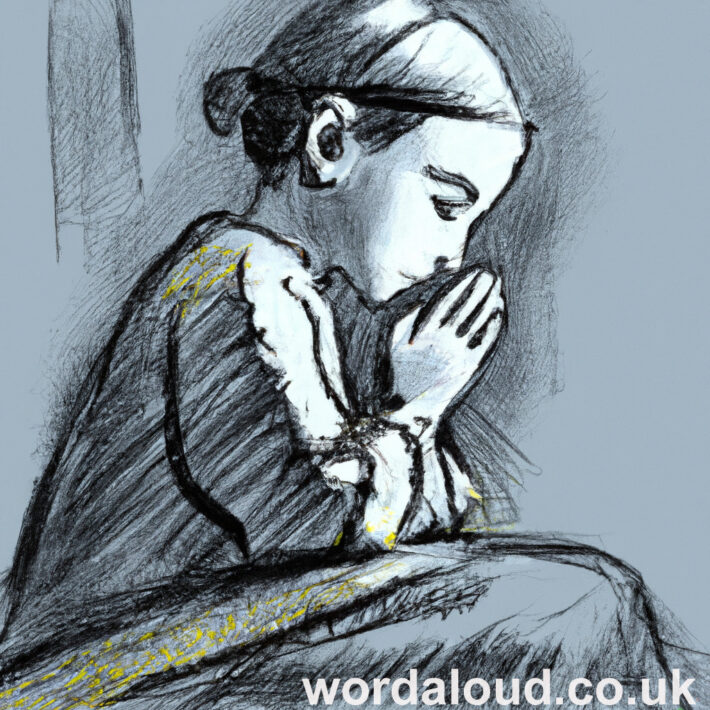Christian Art | Prayer With Jesus | Psalms | Song Of Trust In God Alone | King David As A Boy | King James Audio Bible | KJV | Word Aloud
Psalm 62 | King James Audio Bible
YouTube: Psalm 62 | KJV | King James Version | Audio Bible | Word Aloud
Psalm 62 expresses faith and trust in God, highlighting the unwavering relationship between the psalmist and God. The psalm is a testament to enduring belief in God’s unchanging character and His role as ultimate source of salvation and refuge.
The opening lines of the psalm set the tone for overarching themes. The psalmist declares, ‘Truly my soul waiteth upon God,’ conveying a sense of patient expectation. This waiting is not passive but filled with a deep and abiding trust that God will come through, providing strength and deliverance in times of need. It is a powerful reminder of the importance of patience in our relationship with God, acknowledging that God’s timing is perfect, even when it may not align with our own.
Throughout the psalm, the psalmist reaffirms the unshakable nature of God. God is described as a rock, a symbol of strength and stability. This imagery underscores the idea that, in God, there is a firm foundation upon which to build one’s faith and life. The psalmist’s reliance on God as his salvation echoes the sentiment that salvation is not to be found in human achievements or worldly possessions but in the divine.
The psalmist’s unwavering trust in God contrasts with a fleeting and often deceptive nature of human existence. The psalmist speaks of the transient nature of human beings, comparing us to breath and vanity. It is a stark reminder of impermanence of worldly pursuits and the need to look beyond the material realm for true meaning and fulfilment.
The psalmist warns against putting trust in ill-gotten riches, emphasizing that true power and mercy belong to God. This sentiment resonates with the idea that material wealth and worldly success can be deceptive, offering a false sense of security. In contrast, trust in God provides an enduring and genuine refuge.

Psalm 62 | King James Audio Bible KJV | Love Revealed By Jesus Christ
Truly my soul waiteth upon God: from him cometh my salvation.
He only is my rock and my salvation; he is my defence; I shall not be greatly moved.
How long will ye imagine mischief against a man? Ye shall be slain, all of you: as a bowing wall shall ye be, and as a tottering fence.
They only consult to cast him down from his excellency: they delight in lies: they bless with their mouth, but they curse inwardly. Selah.
My soul, wait thou only upon God; for my expectation is from him.
He only is my rock and my salvation: he is my defence; I shall not be moved.
In God is my salvation and my glory: the rock of my strength, and my refuge, is in God.
Trust in him at all times; ye people, pour out your heart before him: God is a refuge for us. Selah.
Surely men of low degree are vanity, and men of high degree are a lie: to be laid in the balance, they are altogether lighter than vanity.
Trust not in oppression, and become not vain in robbery: if riches increase, set not your heart upon them.
God hath spoken once; twice have I heard this; that power belongeth unto God.
Also unto thee, O Lord, belongeth mercy: for thou renderest to every man according to his work.
Key Themes Of The Psalm For Reflection | Love Revealed By Jesus Christ
- Trust In God’s Unwavering Character And Salvation: Psalm 62 emphasizes the importance of placing one’s trust in God. The psalmist acknowledges God as rock and salvation, highlighting the unwavering and dependable nature of the divine. This theme underscores the significance of a strong, unshakable faith in God, even amidst life’s challenges and uncertainties.
- Patience And Waiting Upon God: The psalmist encourages patience and waiting upon the Lord. The use of the term ‘wait in silence’ suggests a tranquil patience, allowing God’s plan to unfold. This theme reminds us that not everything happens on our timetable, and patience in waiting for God’s timing is vital.
- Impermanence Of Human Existence: The psalmist acknowledges the fragility of human existence, comparing people to a mere breath or a fleeting shadow. This theme invites reflection on life’s transitory nature and the need to focus on eternal values and God’s presence, as opposed to fleeting worldly pursuits.
- Warning Against Trusting In Ill-Gotten Riches: Psalm 62 contains a warning against placing trust in ill-gotten riches or fraudulent gain. It speaks to the temptation of relying on material wealth and the consequences of dishonesty. The psalmist cautions that such wealth can never provide genuine security or lasting contentment.
- Finding Refuge And Strength In God’s Unchanging Character: Throughout the psalm, the psalmist seeks refuge in God. This theme underscores the idea that in times of trouble or turmoil, individuals can find solace and strength in God’s unchanging character. God is portrayed as a refuge, a mighty rock, and a fortress. This imagery illustrates the protective and unwavering qualities of the divine.
- Silent Meditation And Prayer: The psalm emphasizes value of silent meditation and prayer. This practice allows for personal reflection, communion with God, and a deepening of one’s spiritual connection. In our often noisy and hectic lives, this theme encourages the practice of stillness and reflection as a means to draw closer to God.
- Rest In God’s Presence: The psalmist expresses finding rest in God. This theme signifies the peace and tranquility that come from entrusting one’s worries and cares to God. It points to the idea that resting in God’s presence can offer solace and relief from life’s burdens.








